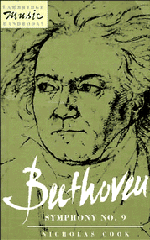4 - The Romantic Ninth
Published online by Cambridge University Press: 08 January 2010
Summary
Interpretation and appreciation
In 1896, an anonymous critic voiced his reservations concerning the opening of the Ninth Symphony in the Edinburgh Review. He complained of ‘the rather eccentric and certainly not happy device of anticipating the real subject by the weak and uninteresting tentative passage, as it may be called, which mystifies the hearer at the opening…. How far grander and more impressive would have been the immediate starting off with the broad and powerful unison passage which forms the real theme of the movement!’ But Antony Hopkins could not disagree more. He says:
I doubt whether in all music there is so profound a statement expressed in fundamentally simple terms as we find here…. Suspense is prolonged with masterly skill so that when the final release into D minor does arrive its force is intensified to an extraordinary degree…. Just as a tidal wave gathers its force invisibly, far out to sea, so this gigantic theme coils itself from a deceptively suppressed opening chord before unleashing its awesome ferocity upon us.
It is not simply that the two writers hear the same music but judge it differently. It is as if they were not hearing the same music at all. In the face of such contradictions, it is tempting to conclude that people's responses to music are irremediably subjective: one person hears it one way, the next hears it another way, and that is an end to the matter.
- Type
- Chapter
- Information
- BeethovenSymphony No. 9, pp. 65 - 80Publisher: Cambridge University PressPrint publication year: 1993



